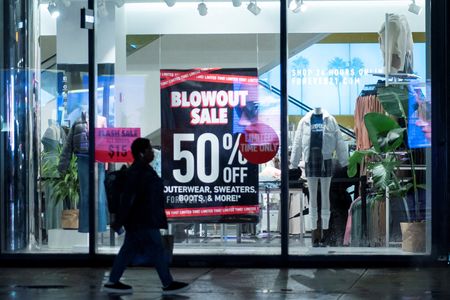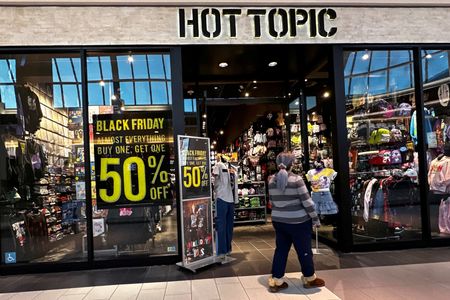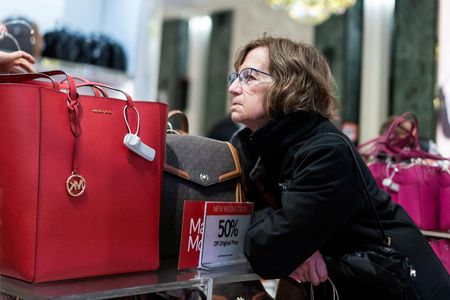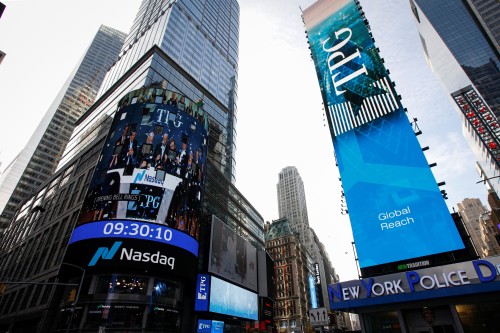By Katherine Masters
NEW YORK (Reuters) – Last-minute shoppers looking for late deals ahead of Christmas may find smaller discounts and fewer items marked down at major retailers including Macy’s, Target and Ulta Beauty, according to an analyst and two datasets measuring retailers’ recent prices.
After ramping up promotions for Black Friday, some of the country’s top gifting destinations cut back both the number and size of their price markdowns on key products from Nov. 1 to Dec. 1, according to data from Centric Market Intelligence, formerly StyleSage, which analyzes retailers, brands, online trends and products across the globe.
At Macy’s, products with price markdowns fell from 49% to 46%, and the average markdown dropped from 20% to 17%, during the time period. At Ulta, products on sale dropped from 10% to 5%, while the average discount dropped from 3% to 2%.
Data analytics firm Vertical Knowledge, which examines pricing and discounts across retailers’ websites, found retailers including Abercrombie & Fitch and Macy’s-owned Bloomingdale’s also shrank or maintained their average discounts on products from November to December after deepening markdowns last year.
Retailers could potentially adjust their discounts in a bid to entice price-sensitive shoppers in the days before Christmas. But so far, “what’s interesting this year is that even though we’re in a promotional environment, the promotions haven’t been very deep,” said Jessica Ramirez, a senior research analyst for Jane Hali & Associates.
The decision to roll back discounts ahead of the Saturday before Christmas – dubbed “Super Saturday” and typically one of the busiest shopping days of the year – highlights the challenges retailers are facing as higher interest rates and other financial pressures weigh on consumer spending.
Promotions have been vital to drawing shoppers during key periods such as back-to-school and Black Friday, as executives at Nike disclosed to investors on Thursday during a post-results conference call.
But cutting back on discounts in December is a way to buoy profits, especially given that Black Friday discounts started as early as October for many retailers.
“The people who are super price-sensitive have already done their shopping,” said Brian Yacktman, president of YCG Investments, which owns shares of retailers including Nike, Amazon and LVMH. And with this year’s Super Saturday falling just two days before Christmas, shopping procrastinators are less likely to care about cost.
“They’re at an inelastic demand point where they’ll pay anything to get the gift” if shoppers really need it, Yacktman said. “Which is a good opportunity for retailers looking to recover their margins.”
FEWER SHOPPERS AND LOWER DISCOUNTS
U.S. retailers expect 142 million shoppers on Super Saturday, a 10% decline from a year ago, according to the National Retail Federation trade group. Store visits in recent days were down from a year ago at chains including Best Buy and Home Depot, according to analysts.
Shoppers are buying less overall. Sales revenue during the 2023 holiday shopping season is 6% lower than last year, and unit sales are 5% lower, according to early data from Circana.
Ben Gibson, a pharmacist in San Antonio, Texas, on Thursday said he was perusing prices on video cameras and a tripod at Walmart, and Best Buy. He said he might buy one he found on Amazon instead.
Stacey Powells of Mammoth Lakes, California, said Thursday that she hadn’t seen compelling prices on gifts for her grandson.
Retailers have spent the past year clearing out excess inventory and reducing orders in anticipation of weaker holiday sales, allowing them to focus more on boosting margins than convincing inflation-weary shoppers to splurge.
Nike is one retailer offering fewer discounts as of Dec. 10 than last year, when its website advertised up to 50% off last-minute gifts, according to data from Jane Hali & Associates.
As of Friday, most discounts on its U.S. website were between 14% and 30%, including a 24% discount on women’s leggings from its higher-priced Zenvy line, which typically cost $100 or more.
(Reporting by Katherine Masters and Siddharth Cavale in New York and Savyata Mishra in Bengaluru, Editing by Nick Zieminski)






